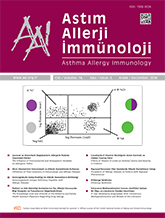


Objective: Frequent infection is the most common reason for presentation to outpatient clinics during infancy and in the pre-school period. The aim of this study was to evaluate the incidence of allergic disorders in patients who apply to our allergy-immunology clinic for frequent infections and receive a diagnosis of immunoglobulin isotype deficiency.
Materials and Methods: The medical records of 2592 patients who presented to the Department of Pediatric Immunology-Allergy of the Ankara University School of Medicine between January 2013 and February 2016 complaining of frequent infections were investigated retrospectively.
Results: 258 (9.9%) patients had immunoglobulin isotype deficiency. The age range was 6-204 months. 151 (58.5%) were male and 107 (41.5%) were female. 17% had parental consanguinity. The diagnosis was selective IgA deficiency in 12 (4.6%), partial IgA deficiency in 31 (12%), isolated IgM deficiency in 53 (20.5%), and transient hypogammaglobulinemia of infancy in 117 (45.3%). 33 (12.7%) were considered as prolonged hypogammaglobulinemia and 12 (4.6%) as unclassified hypogammaglobulinemia. 173 (67%) patients had an allergic disease besides immunoglobulin isotype deficiency. The allergic diagnoses of the patients were asthma in 90, atopic dermatitis in 66, allergic rhinoconjunctivitis in 47 and transient wheezing of infancy in 44. There was no statistical difference between the isotypes regarding co-incidence of allergic disease and immunoglobulin deficiency (p=0.83).
Conclusion: Rates of concurrence with an allergic disease regardless of the type of immunoglobulin isotype deficiency was high in our patients. One must consider that immunodeficiency may be combined with recurrent infection and atopy in patients presenting with allergy symptoms and it is important to investigate accordingly for the appropriate management of treatment.